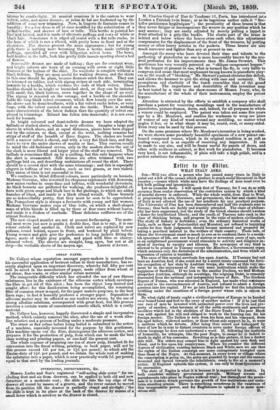Ittttr In fig etitu.
WHAT ITALY ASKS.
Sts.—Will you allow a person who has passed many years in Italy to point out a few of the causes which produce so much social discontent in that country ;—causes which while men have the feelings of men must ever be felt both galling and ignominious. Let us examine facts. I will speak first of Tuscany, for I can do so with accuracy from ocular observation of the restrictive system by which a kind of mental slavery is enforced. While the whole world, from East to West, is progressing in arts, literature, and government, the fair and classic land of ltaly is not allowed the use of her intellects for any practical purpose. The University of Pisa has been dismembered and half the students sent to Sienna; thus 'both are feebly and scantily attended. The chair of philoso- phy has been suppressed, lest the study of the Greek classics should awaken a desire for intellectual liberty, and the youth of Tuscany take rank in the class of thinking beings, and progress in the ratio of modern civilization. The study of history is forbidden ; even the ordinary historical works of Italy, such as those of Guicciardini and Muratori, are refused to inquiring youths for fear their judgments should become matured and prepared for taking a practical interest in the welfare of their country. These lads, of whom the Government stand so much in awe as to condemn them to a monk- ish ignorance of life, are raw boys of sixteen or seventeen years of age, such as an enlightened government would stimulate to activity and diligence in- stead of leaving to vacuity and idleness. No newspaper of any kind is allowed to be printed in Tuscany except the Monitors, a Government organ which contains only the dictations of the administration, and from which all expression of opinion is banished. The onus of this mental servitude lies upon Austria. If Tuscany had not been an Austrian feof, if she could not by a secret treaty command the forci- ble occupation of her state by Austrian troops, i she would at this very mo- ment be in the enjoyment of the very same institutions which make the happiness of Sardinia. If we look to the smaller Duchies, we find Modena altogether Austrian, although its sovereign, the reigning Duke, is remotely descended from the national and independent house of Este. The Duchess Regent of Parma, who was educated in England, has made what resistance she could to the encroachments of Austria, and refused to admit a foreign garrison into her capital. If we go into Lombardy we find the inhabitants writhing under the exactions of a foreign power whose rule is odious to them.
By what right of treaty ought a civilized province of Europe to be handed over bound hand and foot to the sway of another nation ? If it be just that one race of men be invested with unlimited power over the lives and pro- perty of another, what becomes of all the noble sentiments and generous sacrifices which led to the abolition of the Slave Trade ? The poor Black was sold against his will and obliged to work in the burning sun for his foreign master. The Italian is torn from his farm and his vineyard, from his aged father, widowed mother, or those whose sole support he is to wear a uniform which he detests. ifter being thus seized and kidnapped by force of law he is sent to distant countries to serve under foreign officers of whose language he does not understand a word. If, following the instincts of humanity, he attempts, like the poor Negro, to escape he is lashed to death in sight of his comrades. Revolting as is this picture, it has a darker side still. His orders may compel him to fight against his own flesh and blood, and to fire upon his countrymen. When we consider the different degrees of civilization existing between Black and White men we see that the rights of the Italian conscript are more outrageously trampled upon than those of the Negro. At this moment, in every town or village where the conscription is going on, the gates are guarded by troops and the cannon mounted and turned towards the inhabitants, ready to fire at a moment's notice. If England upholds this system, it can only be from ignorance of its enormities. The state of Naples is what it is because it is supported by Austria. In both countries military government prevails. Military arrests and punishments take place in Naples without trial ; but throughout the penin- sula it is Austria which prevents the growth of free institutions and main- tains standing armies. There is something monstrous in the existence of this irresponsible power, and for Englishmen to uphold it is more mon-
strous still. D.


























 Previous page
Previous page